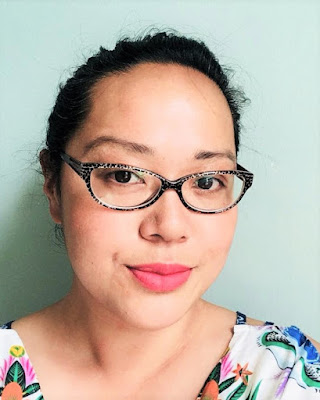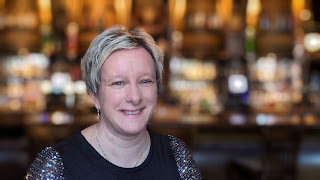WRITERS’ MINDS Maisie Chan (Part 1)
In 2022 you won the Jhalak Prize for Children & YA with your brilliant middle grade Danny Chung Does Not Do Maths, beautifully illustrated by Anh Cao, with Sabba Khan's incredible graphic novel The Roles We Play winning Best Book too. Can you tell us a little about your experience as a winner and then becoming involved with Professor Sunny Singh and the team at Jhalak, as a judge for the 2023 awards?
Winning the Jhalak Prize was a wonderful experience and one I was not expecting. I was on the shortlist with some heavy-hitting books, and I thought I didn’t have a chance of winning with my middle grade book about a boy and his nan. I was quite emotional on the evening of the announcements as I had been following the Jhalak Prize since its inception in 2017. It gave me a big confidence boost and winning the Branford Boase award a few months later made me think it wasn’t a fluke!
The Jhalak Prize is a very special award for writers of colour in the UK and unlike a lot of other awards it has a remit for championing the longlist, shortlist and the winners. It is an award that fosters community with Professor Sunny Singh at its helm and a team of passionate volunteers who are keen to see British publishing change. Even before the prize is announced there are Jhalak opportunities for various writers on the shortlist, such as an evening at the London Library and a table at the British Book Awards (the ‘Nibbies’) which other prizes do not have.
On the marketing side, it has done wonders to help me get my name and the book title out there. When I won, there were over 110 independent book shops signed up to help promote the prize. This year it was around 150. They request display materials, and many do Jhalak Prize displays. And the larger book retailers such as Waterstones, Hive, Bookshop.org, Foyles and National Book Tokens also help by featuring the prize in their newsletters and on their websites. Not to mention being featured in The Guardian and The Bookseller. This year’s winners were interviewed on BBC 4’s Front Row, so it’s grown even more since last year. As a judge I’ve seen the breadth and depth of British children’s and YA literature from writers of colour in the UK. It is a hopeful outlook and it’s clear to see that many are not just ‘diversity’ books but at the top of the pile in terms of craft and originality.
I was happy to see such wonderful genre books this year. There was amazing fantasy worldbuilding from new writers such as Janelle McCurdy (Mia and the Lightcasters) and Ann Sei Lin (Rebel Skies) both of whom tap into the young readership of today. Also, the hilarious teen rom-com Ellie Pillai is Brown by Christine Pillainayagam was a fresh read for the UK YA market. We’ve seen books like that in the States but not so much here. I think the shortlist this year recognised also how difficult it is to write and illustrate picture books with Dadaji’s Paintbrush (Rashmi Sirdeshpande and Ruchi Mhasane) and In Our Hands by Lucy Farfort. The winner Danielle Jawando blew the judges away with her craft and storytelling in When Our Worlds Collided. It’s not easy to write from three perspectives coherently and each time highlight a different part of structural and institutional racism on young Black teens. I think Danielle’s book should be in every secondary school in the country, it’s so powerful!
You've written across all ages and published to much acclaim. Do you approach each age range manuscript differently? What's been your favourite book to work on so far?
I have written quite a few different stories for varying age groups. I’ve written for 3-5 year olds (Amy Wants a Pet), the Tiger Warrior series is a bit like Beast Quest and great for newly independent readers (but also are great for those older readers who maybe have less attention space for larger novels). And of course, my novels and short stories for roughly 8-12 year-olds and above. Plus, I’ve dabbled in some historical fiction recently and I would like to do more historical pieces.
I do write with an age group in mind. I know some people say, don’t worry about your audience, write a book you love. I would say, well… you can write a book that YOU love, but your readership is a certain age group when you write for children. Readers often read up a couple of years, so my protagonists for my novels will be around 11 or 12 years old. And I must think about the ‘voice’ of the main character and what they might be concerned with. I really want them to sound like real children, I don’t want my characters to sound like an adult wrote the book.
My favourite book to have worked on was Danny Chung Does Not Do Maths. I had more time to play around with that book, find the voice and the characters and piece together a layered novel. I had certain themes I wanted to address such as finding your voice, micro-aggressions and communication with family members when you don’t share a common language or culture. I wasn’t sure whether to have a Chinese takeaway as it is a stereotype, but I wanted it to be a homage to all of the people who had come from Hong Kong and China to work in the food industry, to make a better life for themselves and their children.
Ell Rose is the Illustration Features Editor of Words & Pictures. Contact them at illustrators@britishscbwi.org
Tita Berredo is the Illustrator Coordinator of SCBWI British Isles and the Art Director of Words & Pictures. Contact her at: illuscoordinator@britishscbwi.org














No comments:
We love comments and really appreciate the time it takes to leave one.
Interesting and pithy reactions to a post are brilliant but we also LOVE it when people just say they've read and enjoyed.
We've made it easy to comment by losing the 'are you human?' test, which means we get a lot of spam. Fortunately, Blogger recognises these, so most, if not all, anonymous comments are deleted without reading.